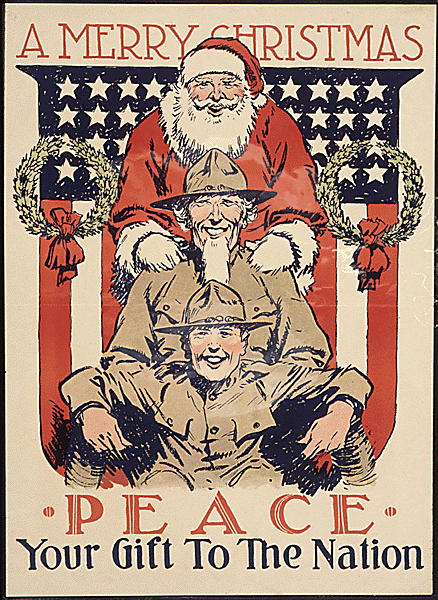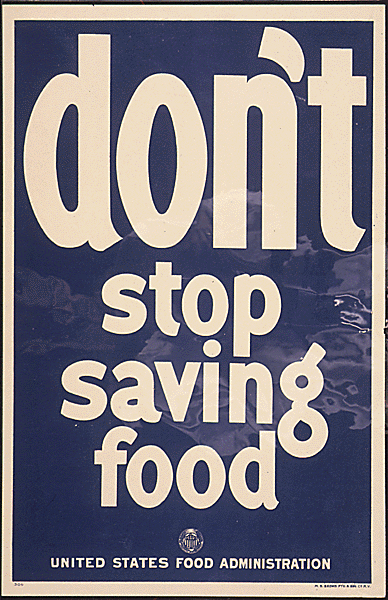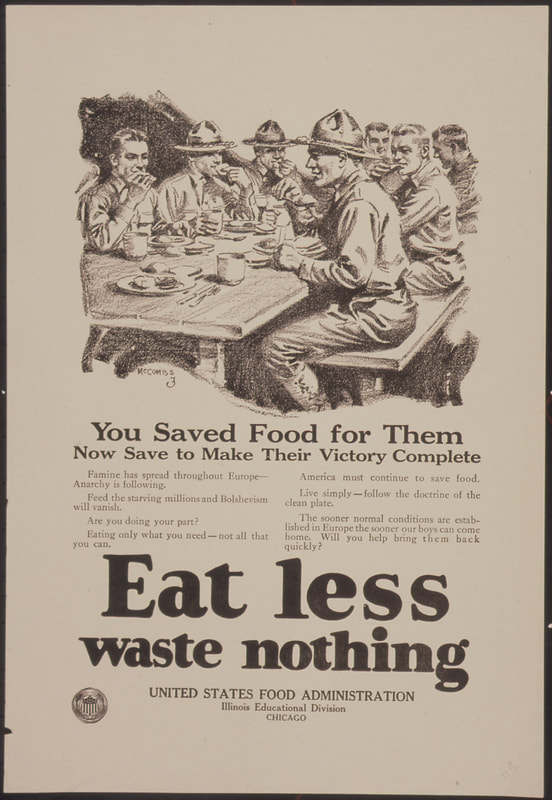|
Most people know that the First World War official ended on Armistice Day - November 11, 1918 (the eleventh hour, of the eleventh day, of the eleventh month, to be exact). The war that was supposed to be over by Christmas had finally ceased, just four years after it began. But although the guns had stopped firing, the Treaty of Versailles was not signed until June 29, 1919. Armistice came on the heels of winter, after several devastating years of war in Europe. Agricultural fields were destroyed and so many men had been killed it was uncertain if labor would be available to cultivate fields again in the spring. Herbert Hoover and the United States Food Administration, along with President Woodrow Wilson, knew that the food supply for both American troops staying on in Europe for the next few months, the Allies, and even the defeated Germans would continue to need food aid. Hoover was left with the difficult task of convincing Americans that not only did they have to keep saving food, despite the official end of hostilities, they would also have to feed their former Hun enemies. But the American harvest, geared up for another potential year of war, had been a good one. And the USFA began to lift restrictions on commercial food production, retailing, and food service industries. By December 22, 1918, the last of these restrictions had been lifted, just in time for Christmas. The New York Times article above, published December 23, 1918, reads: "LAST BAN ON FOOD IS LIFTED TODAY Federal Administration Drops Restrictions on Public Eating Places BUT URGES CONSERVATION Its Activities Are Now to be Centered on Preventing Profiteering and Speculation. Special to the New York Times. WASHINGTON, Dec. 22. - Announcement was made by the Federal Food Administration tonight of the issuance of orders dropping all food restrictions beginning tomorrow morning. From time to time various regulations have been abandoned, and since Oct. 21 last the principal specific food regulations in force were those known as the "twelve general orders for public eating places." These latter are to be dropped, effective tomorrow morning. In rescinding the "twelve general orders" the Food Administration emphasizes the need for continued care in food in order that the United States may meet its pledge to relieve conditions abroad. The twelve general orders for public eating places, which were designed as a war measure to restrict food at the time the devices of meatless and wheatless days and the substitution of one food for another were abandoned, went into effect on Oct. 21. It is estimated that 9,000,000 persons take their meals in public eating places - hotels, restaurants, cafes, clubs, and dining cars - and the food saving through this system of conservation is declared by the Federal food officials to have been very great, despite the fact that compilation of the total savings has not been possible to date. In notifying the Hotel Chairmen on the staffs of the Federal Administration of the decision to rescind the present food regulations the Hotel Division of the Food Administration asked that they hold themselves in readiness to assist in putting into effect any specific measure which public eating places, through developments in world relief, may in the future be called upon to carry out. The twelve general orders provided that no public eating place should serve bread or toast as a garniture or under meat, allow any bread to be brought to the table until after the first course, or serve to one patron at anyone meal more than one kind of meat. Bacon was barred as a garniture. A half ounce of butter was regarded as a portion, and cheese was limited to a half ounce for a meal. Nos. 8 and 9 referred to the sugar restriction. The others referred to waste and the use of cream and butter fats. Conservation Still Urged. Notwithstanding the lifting of restrictions the Food Administration will not cease its activities entirely until a Presidential proclamation releases the public from the Food Control act, which may be some months in the future. Meanwhile, particular attention will be paid to profiteering and speculation in licensed food products. The profit and margin rules will be enforced as they have during the last few months. The New York Federal Food Board issued a statement yesterday urging the proprietors of eating places to continue conservation of foodstuffs. "There should be no waste or extravagance in the use of any foods," said the statement. "All food should be prepared and served with the idea constantly in mind that America must send 20,000,000 tons of food to hungry Europe during the next twelve months and that the greater part of this food can be secured only by saving." The board made public the following telegram from the Food Administration at Washington: "Partial demobilization of the Food Administration and the withdrawal of many of its rules and regulations have given the impression in some quarters that all activities have ceased, or are shortly to cease. This is not the case. The act imposes upon the administration certain obligations, which continue until Presidential proclamation releases us from the Food Control act, and particularly the obligation to curb profiteering and speculation in licensed food products. This function must continue to be performed, and there is not intention of relaxing in this direction. It has been possible, now that peace is assured, to cancel many requirements for reports and many of the details of the regulations, but the profit and margin rules have been, for the most part, retained, and will be enforced by revocation of license and other appropriate penalties. It is expected that it will be possible from time to time to remove certain commodities from the license list, but this will be limited to commodities which do not seem likely to be subject to possibility of speculation and profiteering." The above propaganda poster from the Chicago division of the US Food Administration, features doughtboys at a mess table and reads "You Saved Food for Them, Now Save to Make Their Victory Complete. Famine has spread throughout Europe - Anarchy is following. Feed the starving millions and Bolshevism will vanish. Are you doing your part? Eating only what you need - not all that you can. America must continue to save food. Live simply - follow the doctrine of the clean plate. The sooner normal conditions are established in Europe the sooner our boys can come home. Will you help bring them back quickly? Eat less, waste nothing." Playing on fears of the 1917 Russian Revolution and the spread of socialism in Europe, the United States Food Administration used the admiration for "our boys" to convince Americans to keep up their thrifty wartime ways, even as food restrictions were being relaxed. Christmas, 1918, was likely a very happy one for most Americans - the war was over, the danger of German invasion a thing of the past, and the United States and her Allies victorious. Being able to have a basket of bread and butter before a restaurant dinner of steak probably didn't hurt, either. But many American soldiers remained in Europe, helping rebuild villages and roads, burying the dead, and otherwise securing the countryside. And 1919 would hold domestic unrest for the United States. It was the war to end all wars, and it changed the global balance of power, and Western society, forever. If you enjoyed this World War Wednesday post, consider becoming a member of The Food Historian! You can join online here, or you can join us on Patreon. Members get access to members-only sections of this website, special updates, plus discounts on future events and classes. And you'll help support free content like this for everyone. Join today!
0 Comments
Your comment will be posted after it is approved.
Leave a Reply. |
AuthorSarah Wassberg Johnson has an MA in Public History from the University at Albany and studies early 20th century food history. Archives
July 2024
Categories
All
|





 RSS Feed
RSS Feed